
By 2050, Africa is expected to be home to 2.5 billion people – many of whom will live in cities where they will increasingly use motorised transport. Even the countries are heterogenous, they have one thing in common, often already today’s transport systems cannot cope with this enormous growth.
This means that transport-related greenhouse gas emissions will increase rapidly. According to forecasts (SLOCAT 2021), these could amount to more than 1 gigaton of CO2 in 2050, only considering the transport sector. This would repeat a development that has been observed in Asia and especially in China since the 1980s and calls into question the achievement of the Paris climate goals.
At the same time, an extreme vulnerability to the consequences of climate change is already clearly noticeable in Africa today. While mobility of people and goods is a prerequisite for economic development, non-sustainable transport systems are at the same time a threat and may hinder achieving the SDGs and lead to several problems.
The current social discourse in Africa is shaped by the need for economic development and challenged by strong social inequalities. State institutions often lack capacities and well-trained personnel with respect to the challenges ahead. International support is concentrated on the few institutions and partners that are often overstretched to translate support into concrete action.
Against this background, the opportunity for leapfrogging towards climate-friendly, sustainable mobility has hardly been debated so far. That’s why it was widely welcomed that policymakers, planners, entrepreneurs, and researchers from more than 20 African countries came together online during the Africa Conference Day of Transport Week 2022 to discuss how to make transport more climate friendly on the continent.
Six month ahead of COP27 in Egypt, high-level representatives from various African countries (watch the recordings of country spotlights and the high-level panel) emphasized, that the climate conference will be quite important for outlining a vision for the continent. For example, Transport Minister Moges from Ethiopia shared her vision for sustainable transport:
Especially African nations shall devote themselves and invest their time money and resources in safe and sustainable mobility. (…) We have to clearly indicate in our policies, strategies and plans that creating a sustainable environment through sustainable mobility is our focal agenda.
Dagmawit Moges (Ethiopian Transport Minister)
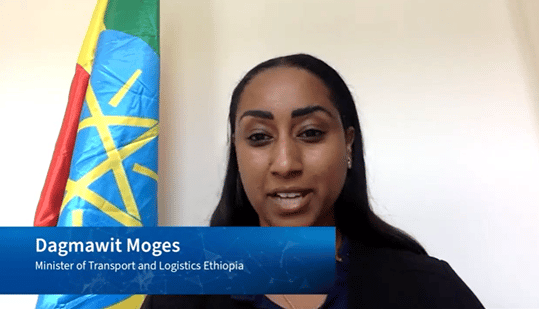
Decarbonizing transport and providing sustainable mobility systems is not an easy task. But the Africa event in the context of GIZ’s Transport and Climate Change Week and funded by the International Climate Initiative of the German government gave also some hope and provided relevant key insights on the necessary transition in Africa. These can be understood as starting points for further discussion.
The current low level of motorisation and urbanisation offers the opportunity to finance infrastructures in the coming years that combine high mobility with low traffic volumes. However, it is the shared responsibility of national governments and investors to coordinate and prioritise financing decisions in the transport sector. Currently China is the largest donor with about 25%.
But the EU – currently only responsible for 6% of investments – is stepping up its efforts and only recently launched the Global Gateway Initiative (watch recording). The plan, presented by Paolo Ciccarelli of the European Commission (DG on International Partnerships), is aiming at enhanced and greener EU-Africa connectivity. This is in line with the African Unions plans to develop corridors across the continent, which is currently supported by the Programme for Infrastructure Development in Africa (PIDA). If that plan is implemented, the share of railways could increase from 0,3% to more than 8% for freight alone (ECA 2022).
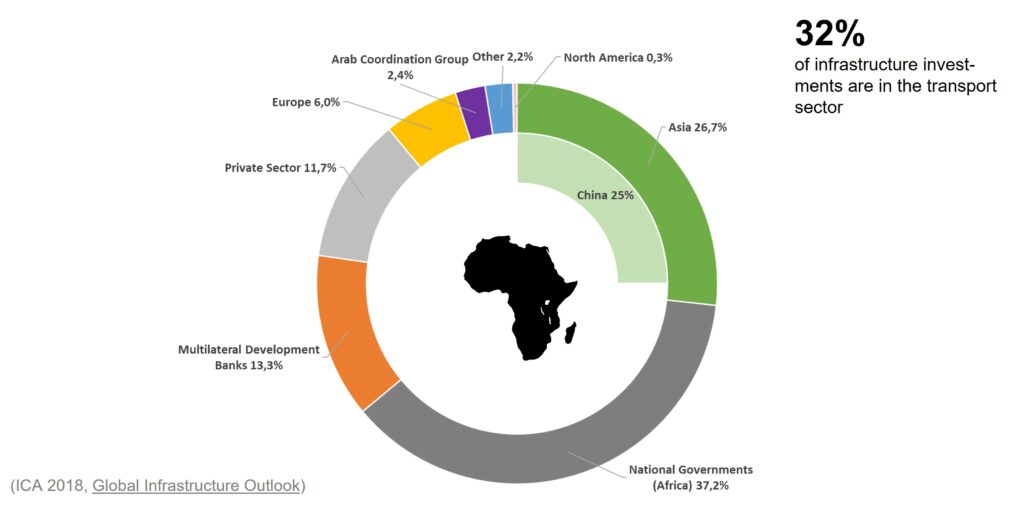
Data is an enabler for evidenced-based decision making and planning and therefore important for the development of the African continent. For example, Hindolo Shiaka from Sierra Leone explained how important data is to adapt transport infrastructure to climate change.
A vehicle industry can be developed in a sustainable manner.
In Africa, there are plenty of opportunities for enhancing renewable energy. Wind and sun can also power the transport sector, assuming if African countries focus on electrifying transport, as Asia, Europe or Latin America. This would require that the vehicle industry develops in a sustainable manner.
The workshop Unlocking the Electric Mobility Value Chain in Africa looked at how to unlock the value chain of electric mobility for the continent. Currently, more than 41% of the globally exported used cars are imported to the African market and 95% of car registrations in Africa are used cars (UNEP 2021). This dumping of polluting, second-hand ICE vehicles has to cease and be replaced by a local e-mobility solutions.
Bodawerk International from Uganda, WeTu from Kenya and Cargo Bike Africa are three examples of social enterprises that take up the challenge of building blocks of this local e-mobility value chain in their countries. To ensure long-term sustainability, implementing circular economy principals and thinking of multiple uses and lives of batteries (see our publication here) will be crucial.

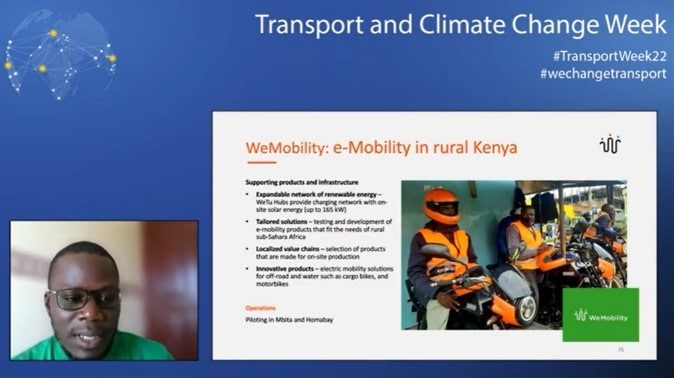
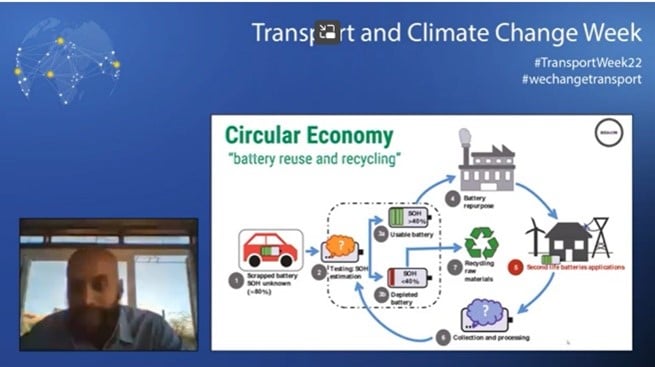
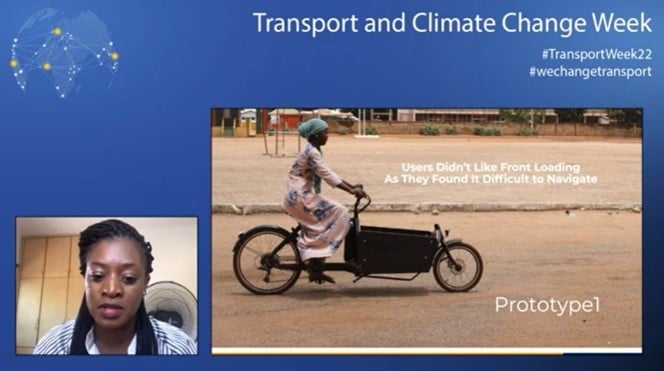
One example for a successful policy transformation towards electric vehicles is Cabo Verde. In the session on transport and climate strategies of African countries (watch recording) the country presented its electric mobility action plan. The two other presenting countries Tunisia and Cameroon, both introduced their national urban mobility policies, that represent important pillar of their transport climate ambition.
While more and more people move to cities, this is where people start to motorize. Cities are growing rapidly, and planners now need to take decisions that will influence travel behaviours for decades.
The MobiliseYourCity Partnership looked at local transport authorities (watch recording) with practical examples from Dakar and Abidjan). Such institutions are urgently needed to have a structured mobility system, to implement mobility policies, to manage the market and better rule the system of mobility. Such an institution would complement the efforts of more and more cities that develop Sustainable Urban Mobility Plans (SUMPs).
A key issue for SUMPs and African transport authorities would be the question, how to include paratransit operators. Informal transport is not only an important economic sector and delivers most of the transport services in hundreds of African cities, but they provide millions of jobs. Transforming transport in Africa is only possible if mobility needs of different social groups are considered.
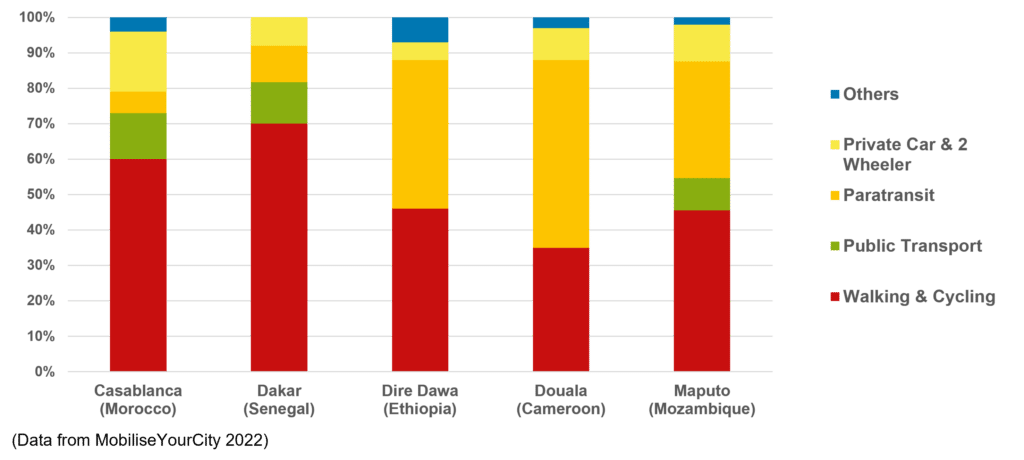
In many African cities, 60 to 80% of the population walks or cycles. The challenge on how to maintain such high shares of active mobility is not receiving the attention it deserves. The workshop Streets for Walking and Cycling co-organized by ITDP and UNEP (watch recording) gave not only inspiring examples on bike-sharing in Cairo and city planning in Addis Ababa but UNEP also launched a Pan-African Action Plan for Active Mobility. The initiative intends to fast track the dialogue on active mobility on the continent and improve the infrastructure for walking and cycling.
Finding ways of increasing the welfare on the continent while curbing (transport-related) greenhouse gas emission is the key challenge that is at stake in the coming decades. The Africa Day gave us reason for hope.
Start-ups presented their approaches to sustainable mobility and presented Sustainable Mobility as a Business Case (watch recording). The workshop on Data and Digitization for Better Mobility (watch recording) with Digital Transport 4 Africa showcased that open data is thereby a key enabler to for new business models and entrepreneurs. And finally, the SLOCAT Young Leaders, a group of smart students researching in Africa, inspired participants with a mock debate on the future of public transport (watch recording).
Decarbonizing transport and providing sustainable mobility systems is no small task. This is true in Africa as well. The 11 hours long programme in English and French showed impressively, how the sustainable mobility debate is gaining pace and how it can link mitigation, adaptation and sustainable development. COP27 in Egypt is a chance to move this up on the political agenda.
In further articles you can get more insights from different regions that have discussed various topics during Transport and Climate Change Week 2022.
Recordings of almost all sessions are accessible through the Programme on transportweek.org and available on the Changing Transport YouTube Channel. Find more impressions of the week on Flickr!
Mark you calendars: The next Transport and Climate Change Week will take place in September 2023.
The Transport and Climate Change Week was organised for the 5th time and is funded through the International Climate Initiative (IKI) of the German Federal Ministry for Economic Affairs and Climate Action (BMWK) and the German Federal Ministry for the Environment, Nature Conservation, Nuclear Safety and Consumer Protection (BMUV). It involves partners of GIZ and other implementing organisations and is organised by the Changing Transport Team of GIZ.
You are currently viewing a placeholder content from X. To access the actual content, click the button below. Please note that doing so will share data with third-party providers.
More Information